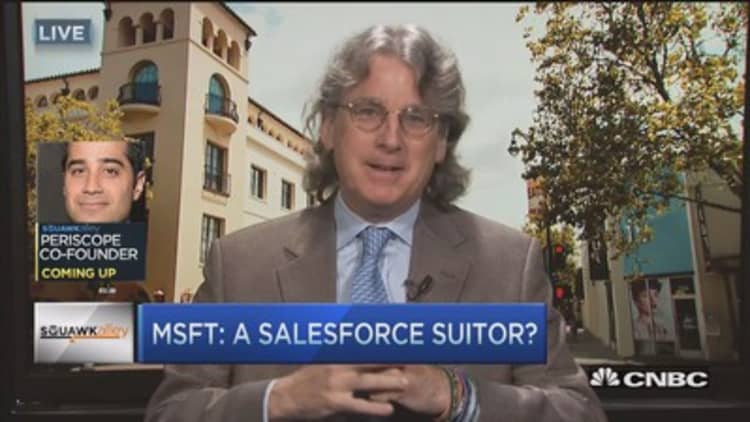Salesforce.com is for sale, some reports say. No wait—there aren't any buyers, say others.
If Silicon Valley had a say in this, most parties—especially start-ups—would prefer the latter outcome, chiefly because the disappearance of one of the largest business software companies would significantly shrink the pool of potential start-up buyers.
Salesforce is a local darling. Over the past 16 years, navigating through multiple financial and economic crises, founder and CEO Marc Benioff has grown the company from a niche developer of Web-based customer relationship management software to the pioneer of a massive category called software as a service (SaaS).
Read MoreMicrosoft eyeing Salesforce?
Now, with a market value of $47.5 billion, the only U.S. business software companies that are bigger are Microsoft, Oracle and IBM.
"Silicon Valley is always rooting for the new generation trying to do things differently," said Nick Mehta, CEO of Gainsight, a Redwood City, California-based cloud software start-up that's backed by Salesforce's venture arm. "Nobody is a better poster child of that than Marc Benioff."
Since Bloomberg reported in late April that Salesforce hired financial advisers to field takeover-related calls, the pool of potential buyers has seemingly evaporated. Among the few companies that have the market capitalization to do the deal, SAP, Oracle and Microsoft have all reportedly said that they're not interested.

Over the years, Salesforce has been a major acquirer of other venture-backed start-ups, snapping up more than 30 companies, including Heroku, Buddy Media and RelateIQ. Salesforce's venture group has made more than 75 investments, according to its website.
A new parent could mean a lot less deal-making.
Read MoreRoger McNamee to Microsoft: Don't buy Salesforce
"I'd hate to see it go become part of something bigger," Jeff Richards, a managing partner at venture firm GGV Capital and Salesforce shareholder, said on a panel at the Collision conference in Las Vegas last week. "It's such a tremendous company that does so much for the community."
Benioff, who had been a career Oracle executive, is the classic Silicon Valley story. In 1999, he started a company whose mission was to take on a giant incumbent in Siebel Systems (later acquired by Oracle), and ended up creating not just a challenger but the market leader.
By 2013, Salesforce controlled 16 percent of the customer relationship management market, ahead of SAP at 13 percent and Oracle at 10 percent, according to Gartner.
In the process, Benioff became a billionaire, philanthropist and outspoken advocate on social and political issues.
Among the 41 publicly traded cloud companies tracked by the Bessemer Venture Partners cloud index, Salesforce is by far the largest with a valuation of over $47.5 billion, as of Friday's close. LinkedIn is second at $25 billion, followed by Workday at $17 billion.
Microsoft, which had been considered the likeliest Salesforce buyer by several Wall Street analysts, has a spotty history with acquisitions. It's biggest deal was Skype ($8.5 billion) in 2011, a popular product that looks much like it did before the purchase. The company made a disastrous mistake in paying about $6 billion for online advertising company aQuantive in 2007.
Microsoft's $1.2 billion deal for business messaging and collaboration service Yammer hasn't paid off at all.
"I don't want to see a repeat of Yammer, where there's no core product left," said Faizan Buzdar, CEO of Convo, a San Francisco-based start-up that competes with Yammer. "I would love to see Salesforce stay independent."
Read MoreHere's why Microsoft could buy Salesforce
Rory O'Driscoll, an investor in SaaS businesses at Scale Venture Partners, says if Microsoft was going to buy Salesforce it should have done so 15 years ago. (Tweet This) Speaking on the same panel as Richards last week, O'Driscoll, who is also a Salesforce shareholder, sees little value in such a desperate move at this point.
"For Microsoft, it's buying relevance at the expense of shareholder value," said O'Driscoll, whose investments include Box and DocuSign. "Who am I to say they shouldn't do that, but I wouldn't be excited if I was a stockholder."
Representatives from Salesforce and Microsoft declined to comment.


